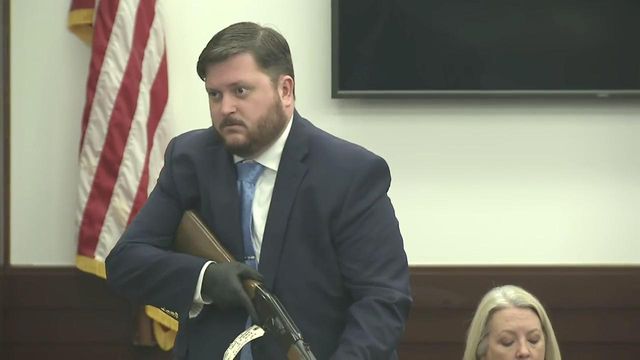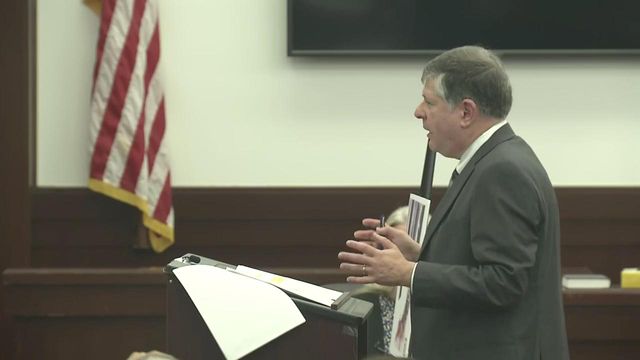Closing arguments in Harnett County: Self defense or wrongful death?
Lawyers delivered their closing arguments Wednesday morning in the civil court trial against the Angier pastor who shot and killed his son-in-law in 2013.
Posted — UpdatedThe Rev. Pat Chisenhall shot Christian Griggs, his son-in-law, to death in 2013. Chisenhall said he fired in self-defense as Griggs tried to break through his living room window.
His attorney argued that he was protected by the North Carolina Castle Doctrine, which allows people to use deadly force to defend themselves, their families or their property within their home, business or vehicle.
Chisenhall shot Griggs six times -- once in the abdomen, once in the shoulder, and four times in the back. With its ruling, the jury said that could not be justified as self-defense.
Lawyers delivered their closing arguments Wednesday morning in the civil court trial against the Angier pastor who shot and killed his son-in-law in 2013.
It's now up to a Harnett County jury to decide whether the Rev. Pat Chisenhall is civilly liable for the wrongful death of 23-year-old Christian Griggs. Chisenhall was never criminally charged in the death, and has said he feared for his and his daughter's lives when he fired his .22-caliber semiautomatic rifle at Griggs as his son-in-law was breaking through Chisenhall's front window.
The Griggs family disputes that claim, and in 2015 filed a wrongful death lawsuit in civil court against Chisenhall. At central issue in the case is North Carolina's Castle Doctrine, which protects those who injure or kill in defense of their lives or property in their workplaces, vehicles or homes.
Christian Griggs was shot six times – once in the stomach, once in the shoulder and four times in the back.
Addressing the jury in his closing arguments, defense attorney Robert Levin, representing Chisenhall, said the interviews his client voluntarily gave to investigators with the Harnett County Sheriff's Office days after the shooting clearly show he was in fear for his life when he shot his son-in-law – and that he also took action to protect his terrified daughter as Griggs was breaking into his home.
"Rev. Chisenhall only did what he did because Christian Griggs said, 'I'm going to kill you.'" Levin said. "And Rev. Chisenhall says that in every interview."
He pointed to both Chisenhall and Katie Griggs' panicked demeanor in their calls to 911 after they said Christian Griggs had broken a front window. And he pushed back against claims from the Griggs' family that Harnett County Sheriff's investigators hadn't done a thorough job and that the crime scene had been altered, noting testimony and notes from law enforcement that Anthony Griggs, Christian's father, had never raised that concern with them in interviews days after the shooting.
Levin reminded the jury that they heard testimony and saw evidence – cards Christian Griggs had sent Chisenhall from Iraq – that the two cared for each other. That Christian could be kind, pleasant, generous and respectful.
"But he could change, and he could be monstrous," Levin said. "And that's what happened."
As for his client's testimony that he can no longer remember the shooting, an effect of his diagnosed post-traumatic stress disorder, Levin said such a condition is a reasonable reaction to a traumatic event.
"If he wanted to make up a story, he could have done that. Same thing for Katie Griggs," Levin said. "It makes no sense for them to lie and not be truthful about what they can and cannot remember, especially Rev. Chisenhall."
Attorney Robert Jessup, representing the Griggs family, said the jury's decision should all come down to the bullets found in Griggs' back, which a state medical examiner testified were the fatal shots. The trajectory from those rounds, he said, showed Griggs was either bent over or on the ground and was no longer a threat to Chisenhall, his daughter or his home.
"Use your common sense. Shooting someone four times in the back while they're bent over or laying down, while they're unarmed, while they're wounded – that is not self defense," Jessup said. "That comes from somewhere else."
He contended it wasn't possible for Chisenhall to fire all six shots the way he originally described to law enforcement, from behind a couch and through a partially busted in window 10 to 12 feet away. And he added that Chisenhall's failing memory meant that he wasn't able to testify on the stand that Griggs was threatening him or whether he had acted in self defense.
"Anybody who shoots somebody four times in the back, that's probably the best defense they're going to get: I can't remember," Jessup said.
He noted other inconsistencies in the Chisenhall's recounting of that day, including three missing shell casings, and a 911 call purportedly recorded while the shooting took place in which witnesses on the stand could hear no gunfire. The Castle Doctrine, Jessup said, doesn't apply if someone has stopped trying to forcefully enter the home.
"This all comes down to the fatal shots, those four fatal shots in the back," Jessup said. "At that point in time, was Christian a threat?"
And he told the jury that their finding was their opportunity to "send a message that something is wrong here."
A verdict in favor of the Griggs family would have to be unanimous, and the jury may decide Chisenhall's actions were justified if he killed in self-defense, defense of a family member or defense of his home.
They'll also decide, if they side against Chisenhall, the amount of monetary damages Christian Griggs' estate would be entitled to. As Griggs' next of kin, any award would go to his 10-year-old daughter Jaden.
The jury may reach a verdict Wednesday.
Related Topics
• Credits
Copyright 2024 by Capitol Broadcasting Company. All rights reserved. This material may not be published, broadcast, rewritten or redistributed.






